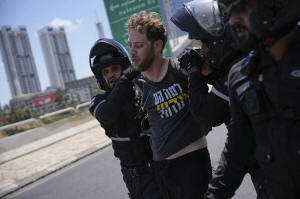Israel's growing frustration over the war in Gaza erupts in nationwide
protests
[August 18, 2025]
By SAM METZ, NATALIE MELZER and SAMY MAGDY
JERUSALEM (AP) — Israeli protesters demanding a deal to free hostages in
Gaza attempted to shut down the country Sunday in one of the largest and
fiercest protests in 22 months of war. Organizers, representing the
families of hostages, asserted that hundreds of thousands of people took
part.
Frustration is growing in Israel over plans for a new military offensive
in some of Gaza's most populated areas. Many Israelis fear that could
further endanger the remaining hostages. Twenty of the 50 who remain are
believed to be alive.
“We live between a terrorist organization that holds our children and a
government that refuses to release them for political reasons,” said
Yehuda Cohen, whose son Nimrod is held in Gaza.
Even some former Israeli army and intelligence chiefs now call for a
deal to end the fighting.
Protesters gathered at dozens of places including outside politicians’
homes, military headquarters and on major highways. They blocked lanes
and lit bonfires. Some restaurants and theaters closed in solidarity.
Police said they arrested 38 people.
One protester carried a photo of an emaciated Palestinian child from
Gaza. Such images were once rare at Israeli demonstrations but now
appear more often as outrage grows over conditions in the territory
after more than 250 malnutrition-related deaths.
Netanyahu opposes any deal that leaves Hamas in power
An end to the war does not seem near. Israeli Prime Minister Benjamin
Netanyahu is balancing competing pressures including the potential for
mutiny within his coalition.
“Those who today call for an end to the war without defeating Hamas are
not only hardening Hamas’ position and delaying the release of our
hostages, they are also ensuring that the horrors of Oct. 7 will be
repeated," Netanyahu said, referencing the Hamas-led attack in 2023 that
killed some 1,200 people and sparked the war.

The last time Israel agreed to a ceasefire that released some hostages
earlier this year, far-right members of his cabinet threatened to topple
Netanyahu's government.
Finance Minister Bezalel Smotrich called Sunday's demonstrations “a bad
and harmful campaign that plays into Hamas’ hands, buries the hostages
in the tunnels and attempts to get Israel to surrender to its enemies
and jeopardize its security and future.”
The new offensive would require the call-up of thousands of reservists,
another concern for many Israelis.
Another 17 aid-seekers killed in Gaza
Hospitals and witnesses in Gaza said Israeli forces killed at least 17
aid-seekers on Sunday, including nine awaiting U.N. aid trucks close to
the Morag corridor.
Hamza Asfour said he was just north of the corridor awaiting a convoy
when Israeli snipers fired, first to disperse the crowds. He saw two
people with gunshot wounds.
“It's either to take this risk or wait and see my family die of
starvation,” he said.
The Gaza Humanitarian Foundation, which runs the Israeli-backed and
U.S.-supported distribution points that have become the main source of
aid since they opened in May, said there was no gunfire “at or near” its
sites, which are located in military-controlled areas.

[to top of second column]
|

A demonstrator is detained as he blocks a road with others during a
protest demanding the immediate release of hostages held by Hamas
and calling for the Israeli government to reverse its decision to
take over Gaza City and other areas in the Gaza Strip, in Tel Aviv,
Israel, Sunday, Aug. 17, 2025. (AP Photo/Ohad Zwigenberg)

An Israeli strike targeting a group of people in the Bureij camp in
central Gaza killed three, according to Al-Awda hospital, which
received the casualties.
Israel’s military did not immediately respond to questions.
Israel’s air and ground war has killed more than 61,900 people,
according to Gaza's Health Ministry, which does not specify how many
were fighters or civilians but says around half were women and
children.
Two children and five adults died of malnutrition-related causes
Sunday, according to the ministry, which is part of the Hamas-run
government and staffed by medical professionals. The U.N. and
independent experts consider it the most reliable source on
casualties. Israel disputes its figures but has not provided its
own.
The United Nations has warned that levels of starvation and
malnutrition in Gaza are at their highest since the war began. Most
aid has been blocked from entering Gaza since Israel imposed a total
blockade in March after ending a ceasefire. Deliveries have since
partially resumed, though aid organizations say the flow is far
below what is needed.
Fears of the coming military offensive
It is not clear when Israel's military will begin the new offensive
in crowded Gaza City, Muwasi and what Netanyahu has called the
“central camps” of Gaza.
The military body that coordinates its humanitarian aid to Gaza,
COGAT, this weekend noted plans to forcibly evacuate people from
combat zones to southern Gaza “for their protection.” Designated
“safe zones,” however, also have been bombed during the war.
War-weary Palestinians insisted they won’t leave, arguing that there
is no safe place in Gaza.
“There are no humanitarian zones at all,” said Raghda Abu Dhaher,
who said she has been displaced 10 times during the war and now
shelters in a school in western Gaza City.
Mohamed Ahmed also insisted that he won’t move south. “Here is
bombing and there is bombing,” he said.

Airstrike on power plant in Yemen
Israeli airstrikes hit Yemen’s capital Sunday, escalating strikes on
the Iran-backed Houthi rebels, who since the war in Gaza began have
fired missiles at Israel and targeted ships in the Red Sea.
The Houthi-run Al-Masirah Television said the strikes targeted a
power plant in the southern district of Sanhan, knocking it out of
service. Israel’s military said the strikes were launched in
response to missiles and drones aimed at Israel.
While some projectiles have breached its missile defenses — notably
during its 12-day war with Iran in June — Israel has intercepted the
vast majority of missiles launched from Yemen. Its military later
Sunday said it had intercepted another, and the Houthis claimed they
had targeted Israel's Ben Gurion Airport.
___
Melzer reported from Nahariya, Israel and Magdy from Cairo. Sam
Mednick contributed from Tel Aviv, Israel.
All contents © copyright 2025 Associated Press. All rights reserved |